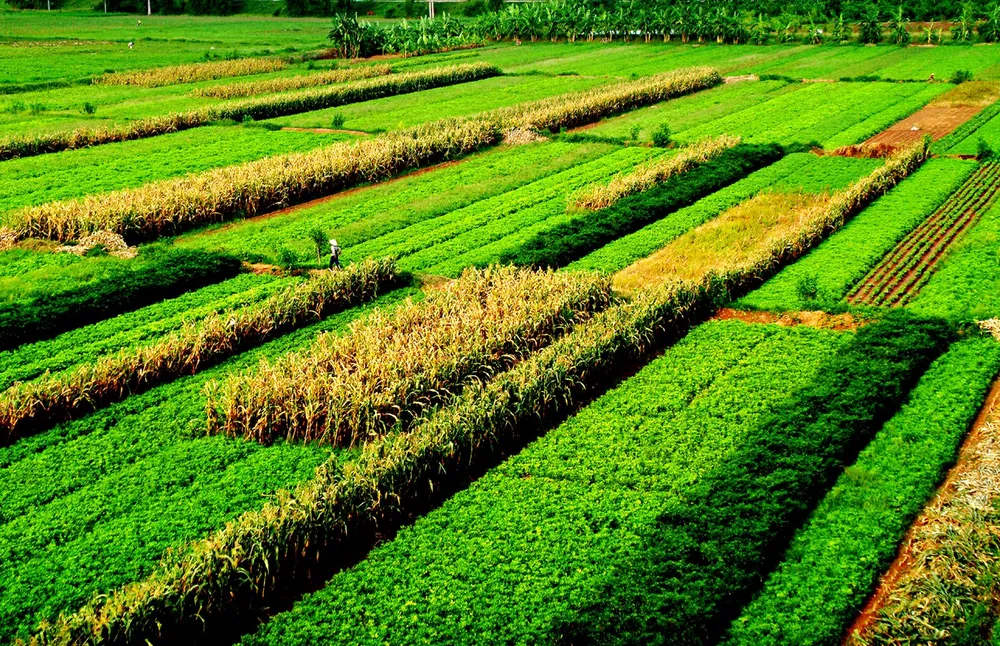
"Heaven and Earth Benefits"
The agricultural sector, particularly cultivation enterprises, experienced a positive shift during the second quarter, buoyed by the escalation in export prices. This translated to a 20% revenue increase for farming companies in Q2, reaching VND 19,000 billion compared to the same period in 2022. Impressively, this figure marked a 35% surge from the first quarter. Notable growth was observed across the rice, fruit, and vegetable segments. In Q2, crop exports clocked in at USD 6.4 billion, marking a 21% upswing from the same period last year and a parallel growth of 21% compared to Q1. This growth was prominently led by vegetables and fruits, with an astounding 88% expansion, followed by rice at 45%.
Analysts attribute the robust growth in vegetable revenue to a combination of factors such as heightened Chinese demand upon its reopening – China stands as Vietnam's principal vegetable export market; new durian regions gaining China's export approval further catalyzed the trend. Particularly noteworthy is the rice segment, with prevailing projections indicating that rice prices will continue their upward trajectory into the third quarter. Factors like Russia's exit from the Black Sea food initiative agreement, El Nino's potential impact on output, and India's ban on rice exports are projected to drive this growth.
Livestock enterprises also witnessed positive momentum in Q2, achieving profitability. A summary of the second-quarter performance of five livestock companies listed by KIS Vietnam Securities Company revealed that revenue reached VND 6,400 billion, marking an 18% improvement compared to the same period in 2022 and a substantial 32% surge over Q1. This upturn is attributed to both demand recovery and reduced supply, culminating in a 4.2% increase in the gross profit margin to 16.4%. The reduction in feed costs, resulting from Russia's rejoining of the Black Sea agreement and favorable El Nino weather conditions, played a pivotal role.
Lack of Consistency
Data collated from 26 listed agricultural sector companies by KIS unveiled a 19% revenue upswing to VND 27,200 billion, primarily driven by a 20% growth in farming companies and an 18% expansion in livestock enterprises. However, upon closer scrutiny, the growth trajectory of gross profit margins presented a different narrative, dipping by 0.6% to a modest 12.1% in Q2. This discrepancy can be attributed to the parallel increase in input costs, such as rice seeds, aligned with export price escalation. Consequently, disparities in efficiency across enterprises have emerged.
Leading companies, such as Southern Food Corporation (VSF) and Loc Troi Group Joint Stock Company (LTG), exemplify this trend. While VSF witnessed an impressive 57% revenue growth, it still recorded a negative post-tax profit of VND 1 billion. In contrast, LTG's profit was largely driven by its acquisition of Loc Nhan Food JSC. Trung An Hi-tech Agriculture Joint Stock Company (TAR) offers another case study. Despite its remarkable revenue surge to VND 1,615 billion (twice that of the same period in 2022), the weight of costs pushed TAR to incur a loss of nearly VND 8 billion.
Doubts About the Future
Despite the mixed reality, agricultural stock prices experienced robust growth. For instance, VSF frequently hit the ceiling price, soaring above VND 37,000 per share. Similarly, An Giang Import-Export Joint Stock Company (AGM), affiliated with the Louis ecosystem led by Mr. Đỗ Thành Nhân, registered a series of ten consecutive sessions of ceiling gains from July 31 to August 4. TAR's ticker also marked an impressive 100% increase since the start of 2023.
However, after this fervent ascent, these stocks faced a sudden cool-off as investors began to comprehend the instability within these enterprises. The warning signs were evident when two TAR board members, Ms. Lê Thị Tuyết (Chairperson) and Mr. Phạm Thái Bình (General Director), unexpectedly tendered their resignations on August 14, citing the need for "restructuring company personnel." It is noteworthy that these two members are a married couple. The move followed TAR's earlier explanation of its loss, attributing it to the liquidation, cancellation, and inability to recover damaged goods dispatched to foreign customers.
The discussion about agricultural stocks wouldn't be complete without a mention of Hoang Anh Gia Lai Group (HAG). After a series of ups and downs, HAG embarked on comprehensive restructuring to reduce debt and enhance efficiency. Focusing on agriculture, HAG aspires to be a leading enterprise in the field. Despite a positive outlook, a recent analysis report on HAG cautioned about its debt risks. As of March 31, HAG owed over VND 8,100 billion in debt and held loans with related parties totaling over VND 6,700 billion. HAG intends to convert these loans into contributed capital to expand its agricultural land holdings. In 2022, interest from lending activities is projected to reach VND 225 billion, meaning that upon successful debt-to-capital conversion, HAG will forfeit this interest, facing higher interest costs in the process.




















